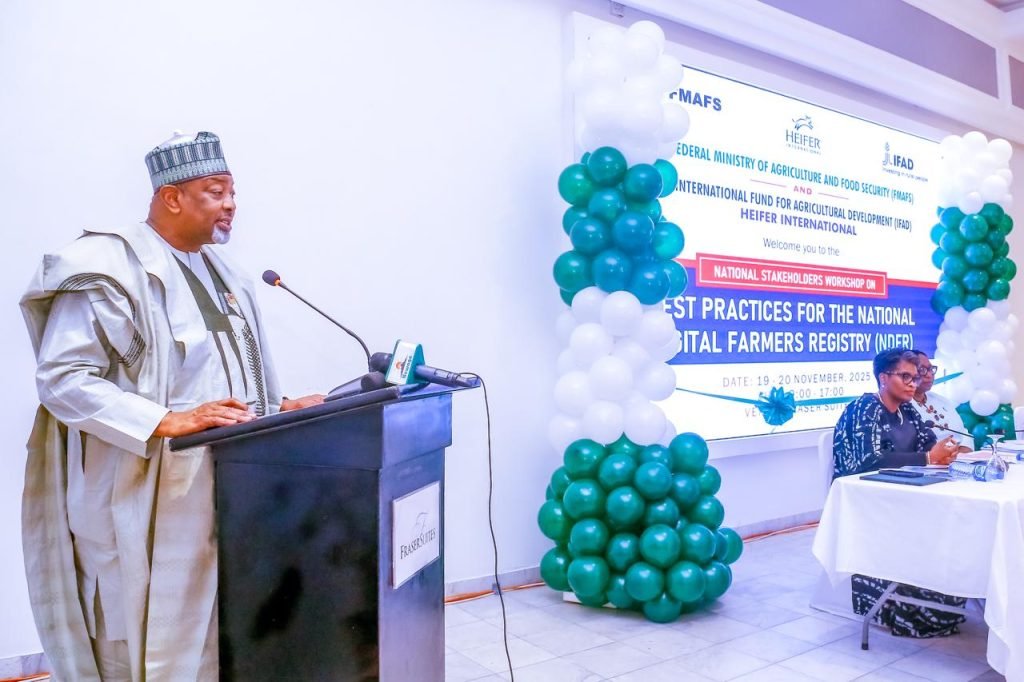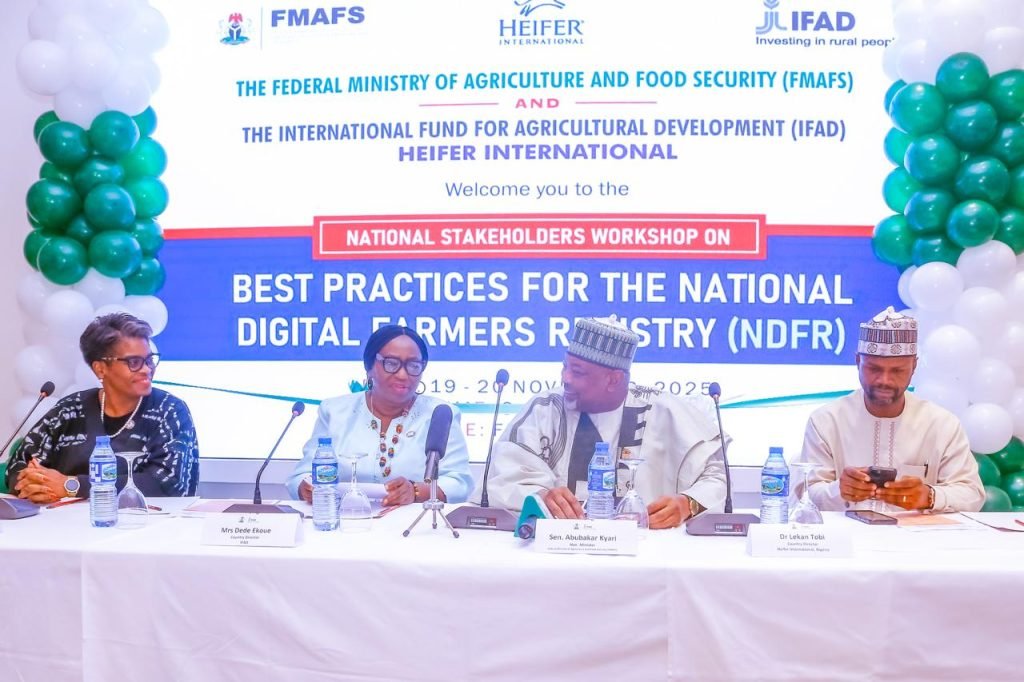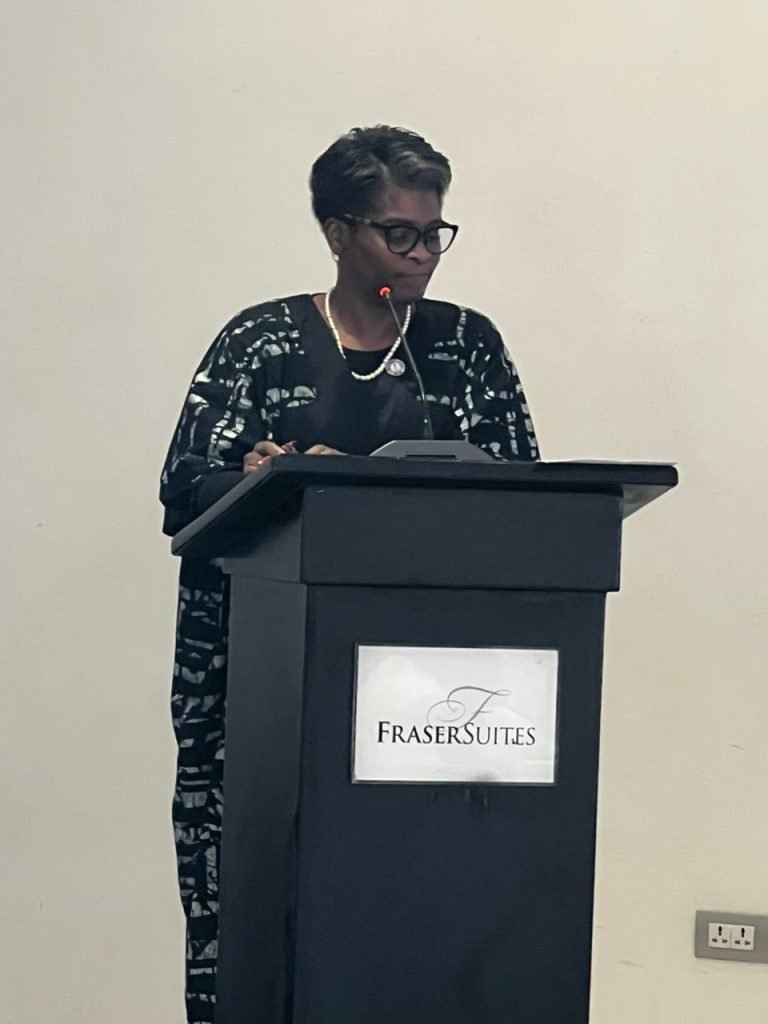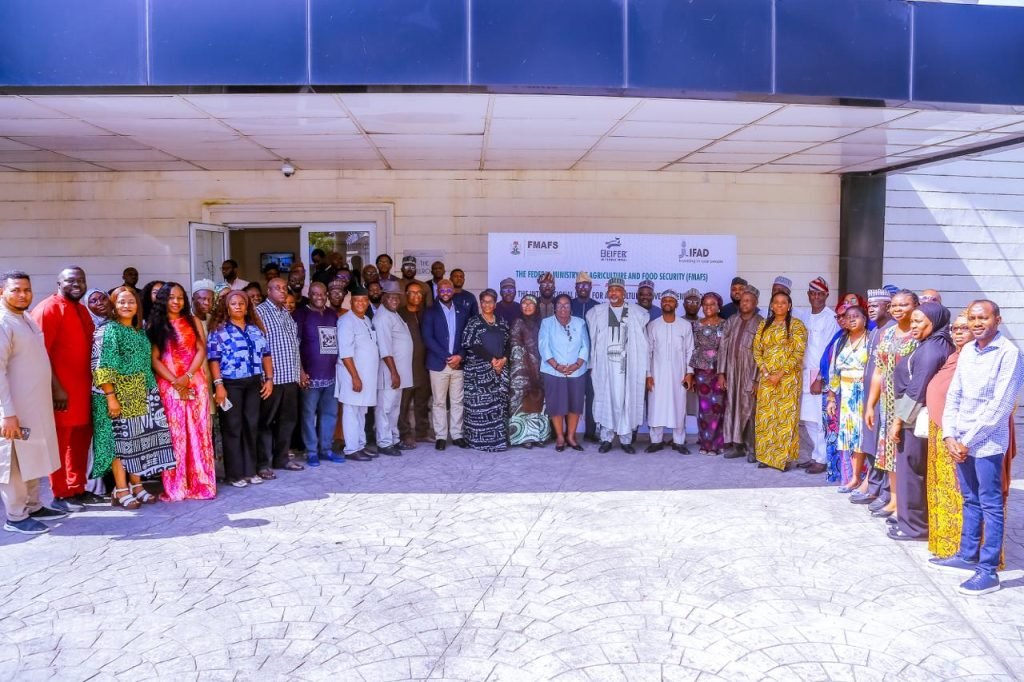The Minister of Agriculture and Food Security, Sen Abubakar Kyari has officially inaugurated the National Digital Farmers Registry (NDFR) Multi-Stakeholder Collaborative Knowledge Sharing Platform to deepen technical understanding of NDFR best practices and validate strategic recommendations for engagement, learning, and coordination across Nigeria’s agricultural ecosystem.
The NDFR aims to establish a precise, real-time, geo-referenced, and disaggregated information platform on Farmers, including their location, commodities, production scale, gender and age. NDFR is positioned as a foundational component of Agriculture Digital Public Infrastructure (AgDPI) in Nigeria – enabling farmer verification, targeted input delivery, financial inclusion, geospatial mapping, value chain integration, and data-driven agricultural planning.

In his keynote address at the National Stakeholder Workshop on Best Practices for NDFR organised by the Federal Ministry of Agriculture and Food Security (FMAFS) in partnership with the International Fund For Agricultural Development (IFAD) and Heifer International, Kyari noted that Nigeria has over the years accumulated multiple farmer databases developed through various programmes, projects, and interventions across federal, state, and partner institutions.
“While these efforts have contributed useful insights, the absence of a unified, verifiable, and interoperable system has resulted in duplication, inconsistencies, resource leakages, and persistent challenges in accurately identifying genuine farmers,” he added.
The Minister described the NDFR as a strategic pillar of the Renewed Hope Agenda and a critical step toward securing Nigeria’s food future.
In his words: “His Excellency President Bola Ahmed Tinubu, GCFR, has made it clear that the era of fragmented farmer databases and uncoordinated agricultural data must give way to a new era of harmonization and digital efficiency.
“To strengthen agricultural planning, deliver targeted interventions, and deepen accountability, Nigeria must operate a credible and unified farmer identification system. The National Digital Farmers Registry is therefore a strategic pillar of the Renewed Hope Agenda and a critical step toward securing our nation’s food future.”
Further explaining, Kyari said the registry goes beyond verification by creating a single, trusted system that brings together accurate information on farmers nationwide.
“With one unified database across the 36 states and the FCT, the government can deliver inputs, mechanization, extension services, credit, insurance, and other forms of support with the precision required to reach the right beneficiaries and promote true inclusion across the farming population.”
Speaking on the importance of the NDFR, Kyari established that a unified registry gives the government clear visibility into Nigeria’s farming population and strengthens transparency, reduces duplication, prevents fraud, and supports accurate planning.
According to him, NDFR also enables interoperability with other national systems and digital agriculture platforms, opening pathways to financial services, climate advisory tools, market information, mechanization access, and early warning systems.
Specifically, the Minister pointed out that NDFR reflects Nigeria’s commitment to the Kampala Declaration on Strengthening Digital and Data Systems for Agricultural Transformation under the Comprehensive Africa Agriculture Development Programme (CAADP) Agenda.
“By building a unified and interoperable digital foundation for agriculture, we are helping shape an Africa that plans with clarity, acts with confidence, and delivers with purpose. This work advances the African Union’s vision for data driven development while deepening regional cooperation, strengthening accountability, and improving the quality of decisions that shape the lives and livelihoods of people across our continent,” he emphasized.
Kyari, who doubles as Vice Chair of IFAD Governing Council, lauded IFAD for its steadfast partnership with the Federal Government. ‘Your leadership in advancing digital innovation in agriculture continues to strengthen our collective drive toward resilience, efficiency, and transparency across Nigeria’s food systems,” he said.
In her opening remarks, Mrs Dede Ekoue, IFAD Country Director, congratulated the Government of Nigeria for taking the bold decision to develop a National Digital Farmer Registry.
This initiative, she underscored, demonstrates a strong government commitment to transforming the agricultural sector and improving the lives of Nigerian farmers.
Ekoue noted that the initiative aims to mobilize key stakeholders toward a robust, NIN-empowered digital farmers registry that enhances service delivery, promotes transparency, and ensures inclusivity.
IFAD CD, however, appreciated the valuable cooperation with Heifer international in the policy dialogue, while also expressing deep gratitude to all the stakeholders, MDAs, development partners, private sector, farmers associations, research institutions that have since May 2025 contributed to the process under the coordination of FMAFS.
Ekoue, therefore, charged all participants to harness the knowledge that will be shared during the two-day workshop, and leverage the NDFR Knowledge Sharing Platform for a collective and synergistic support to the Government in implementing the NIN empowered National Digital Farmer Registry for a more efficient and effective agri-food systems in line with the Kampala CAADP Declaration.

Speaking to AgroNigeria on the sidelines of the workshop, Lekan Tobe, Heifer International Country Director -Nigeria, explained that organisations are jointly supporting a robust policy dialogue to guide the development of the national registry.
Heifer International and IFAD, according to him, are responsible for “researching the best practices and developing the platform, while leading the capacity building process,” adding that their work is directed at ensuring that the NDFR is built on global standards.
Tobe also pointed that the technical support is guided by three core objectives: One, lead best practice research across global best standards to define the roadmap for the development of a NIN-supported digital farmer registry in Nigeria; two, build the capacity of stakeholders in Nigeria; and three, develop a platform for engagement.
“While Heifer may lead parts of the execution, the process involves many diverse stakeholders including development partners, database owners, and institutions holding farmer data nationwide.
“Imagine being able to google farmers in Kano and they all come out, or farmers growing tomatoes in Katsina that helps all of us and that coordination is lacking to a large extent in the country now.”
For Tobe, beyond consolidation of data, NDFR is a critical infrastructure for driving investments and interventions.

Also, Ms. Brenda Mulele Gunde, IFAD ICT4D Global Lead explained that the initiative is designed as a coordinated national effort rather than a single institutional exercise.
“The unified registry will consolidate existing datasets into one reliable national repository that serves as a single source of truth for farmer information.”
Gunde acknowledged that the process comes with expected challenges, but expressed confidence that these hurdles are manageable because of the strong political will behind the initiative and the shared understanding among stakeholders of the registry’s importance.

Meanwhile, in line with the national Agricultural Technology and Innovation Policy (NATIP) and the IFAD/Nigeria Digital Innovation Action Plan (DIAP), the NDFR Policy Dialogue Initiative was launched on May 28th, 2025 to build stakeholder capacity to support a national unified registry, develop strategic recommendations for its rollout and sustainability, and create a multi-stakeholder platform that connects government institutions, private sector, farmers’ organisations, civil society, research institutions and development partners.



5 comments
I am a Cocoa farmer in Ogun State. How do I get registered and get funding?
Excellent initiative to take farmers to greater heights
I am interested
Is a great development to the Nigerian farmers
Very good initiative I hope it reaches us at the grassroots